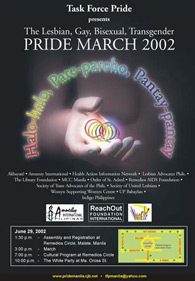Manila celebrated Pride Day last June 29. I heard it went all right. Sadly, I wasn't there to witness any of it.

I think it has something to do with the fairly wide acceptance of gays and lesbians in the country. At least, in the cities. And maybe, because of this, Pride doesn't mean as much as it should to us. Unlike countries in the West, where they had to fight for their liberties and are still fighting for equal treatment, we've had it relatively easy. The West broke ground for us - and for that I personally thank the gay activists there - making it much easier for the mainstream norms to accept us. It's true what they say - you cherish more those things that you work or fight for.
The only time the establishment seems to get involved with the gay strata here, is when the police raid a gay strip bar and the patrons are sometimes pressured to grease palms under the threat of exposure. And even then, no one can really complain, because they do the same to patrons in girlie bars.
It's true, GLBTs here still aren't accorded the same consideration as heteros. But active discrimination is very discreet, practically nonexistent, unless maybe you really dig deep into the social psyche. I have gay friends, in both the arts and corporate worlds, who are quite out and open. Yet, I don't think they've found it harder to grow and thrive in their respective environments.
Some people stay in the closet to protect their reputations, or to avoid hurting family. But it's more the unwillingness to face the occasional - albeit often hidden - ridicule of the macho-shit straight guys, than a fear of being discriminated against. Many gay and lesbian people have built careers despite their obvious preferences. I have yet to really hear of anyone losing their jobs when they came out of the closet.
June 29 should have meant something more than a parade and a street party. The theme was supposed to be Halo Halo, Pareho Pareho, Pantay Pantay (All Together, All the Same, All Equal). I just wish more local GLBTs had felt that way.
I remember last year, while still working full-time with Fridae, about a discussion that went on about the nature of Pride. Some folks in Australia and other western countries were incensed at what they perceived to be the Asian non-involvement with Pride. It was pointed that out that Pride is a personal thing. And that it means different things to the individual. Those Asian assertions of Pride are still maturing.

I took an informal poll among the queens I knew. Almost all had intentions of attending the party (but of course, dear), but hardly any of my friends attended or even wanted to attend the parade. Too hot, too crowded, too troublesome on a Saturday afternoon, nothing to wear, I have to go the gym, I need to get my hair done for the party, etc, etc, etc.
It seemed that gay people of a certain educational level, or at least income level, didn't see the need to attend. Not surprising, perhaps. Intellectuals and people who are comfortable with the status quo rarely see a need to pursue activism, even in non-gay sectors. As it is, the people I was supposed to attend the party with all cancelled, too.
I earnestly applaud the efforts of the organisers, though. I hear they did a truly marvellous job, rallying support from Amnesty International-Pilipinas, ReachOut Foundation International and Wherelse? and other local groups. Kudos, and well done.
By all accounts, the street party was a blast, ending at about 6am. Everyone was celebrating and having a good time. Makes you wonder, though, what everyone thought they were really celebrating. Maybe this year, it'll be more than just another party. One could hope, eh?











 打印版本
打印版本










读者回应
抢先发表第一个回应吧!
请先登入再使用此功能。